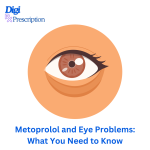
Metoprolol is a commonly prescribed beta-blocker used to treat high blood pressure, heart disease, and certain heart rhythm disorders. While it is effective for cardiovascular conditions, some people may experience side effects, including those that affect the eyes. In this blog post, we will explore the potential eye problems associated with metoprolol, their symptoms, and how to manage them.
How Metoprolol Affects the Eyes
Metoprolol works by slowing the heart rate and reducing blood pressure, which can influence blood flow and nerve signals throughout the body, including the eyes. Some users may experience vision-related side effects, although these are relatively uncommon.
Common Eye Problems Linked to Metoprolol
1. Dry Eyes
Cause: Metoprolol may reduce tear production, leading to dryness and irritation.
Symptoms:
-
Gritty or burning sensation in the eyes
-
Redness
-
Sensitivity to light
Management: -
Use artificial tears or lubricating eye drops
-
Blink frequently, especially when using screens
-
Stay hydrated
2. Blurred Vision
Cause: A drop in blood pressure may temporarily reduce blood flow to the eyes, causing blurry vision.
Symptoms:
-
Difficulty focusing
-
Vision that comes and goes
Management: -
Avoid sudden changes in posture to prevent dizziness and vision disturbances
-
Consult a doctor if blurriness persists
3. Eye Pain or Pressure (Rare)
Cause: Beta-blockers, including metoprolol, can sometimes increase intraocular pressure, which may worsen conditions like glaucoma.
Symptoms:
-
Eye pain
-
Headache around the eyes
-
Seeing halos around lights
Management: -
If you have glaucoma, discuss alternative medications with your doctor
-
Regular eye exams to monitor pressure changes
4. Swelling Around the Eyes
Cause: Some people experience fluid retention as a side effect of beta-blockers.
Symptoms:
-
Puffy or swollen eyelids
-
Mild discomfort
Management: -
Reduce salt intake to manage fluid retention
-
Apply a cold compress to reduce swelling
Who is at Higher Risk?
Certain individuals may be more prone to eye-related side effects from metoprolol, including:
-
Those with pre-existing dry eye syndrome
-
Patients with glaucoma or ocular hypertension
-
Elderly individuals who may experience reduced tear production
When to See a Doctor
If you experience severe or persistent eye problems while taking metoprolol, consult your doctor immediately. Warning signs that require medical attention include:
✅ Sudden vision loss
✅ Severe eye pain or pressure
✅ Extreme light sensitivity
✅ Persistent blurry vision
Your doctor may adjust your dosage or recommend an alternative medication if metoprolol is significantly affecting your eye health.
Tips to Protect Your Eye Health While Taking Metoprolol
✔ Stay hydrated to prevent dry eyes
✔ Use preservative-free artificial tears if needed
✔ Get regular eye checkups, especially if you have glaucoma
✔ Avoid excessive screen time and take frequent breaks
✔ Wear sunglasses to protect your eyes from UV rays
References:
-
American Academy of Ophthalmology (AAO) – https://www.aao.org
-
National Library of Medicine – Metoprolol Side Effects – https://www.ncbi.nlm.nih.gov
-
Mayo Clinic – Metoprolol Drug Information – https://www.mayoclinic.org
-
Glaucoma Research Foundation – Beta-Blockers and Eye Pressure – https://www.glaucoma.org
